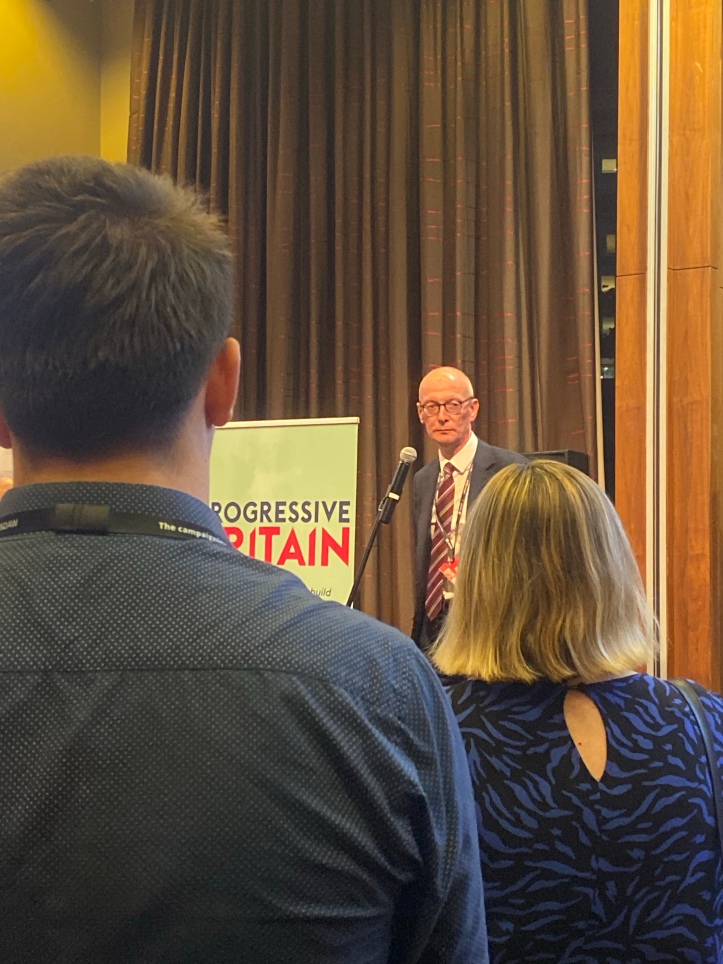Yes, it was big
Not really a ground-breaking insight, this, but Labour 2023 was huge, with packed fringes and exhibitors crammed into pop-up inflatable halls. During my decade of going to these things, it’s usually the case that discussions at the Conservative conference are more policy-specific, especially where industry voices are involved, while Labour discussions are broader and more general in nature. This year, all that was reversed. In two fringes on AI at Labour I learned more about detailed policy and heard wider perspectives than from several sessions last week. Labour are out of their comfort zone, even if not all the industry visitors I spoke to were completely convinced by the party’s offer so far.
Labour is a party asking itself, ‘are we ready?’
Last year, Labour’s mood was boosted by a pre-conference opinion poll placing them 17% ahead of the Conservatives. This year, the vibe was more serious, and not even the stunning swing in Rutherglen last week could have the same effect. Of course there’s a growing confidence, but (so far) neither triumphalism or arrogance. That’s because the party knows it has work to do: first, to seal the deal with the British public and, if that’s successful, to take the reins of office and actually deliver against what the party keeps telling us will be challenging conditions. There’s a determination to be across every detail, and leave nothing to chance.
It’s the Progress party now
Unlike last week’s, this was a conference at ease with itself. But while the Tory front bench were (when not on leadership manoeuvres) upstaged last week by the right of their party (and Nigel Farage), Labour’s left don’t really seem to have been at the ACC. Every year since 2015, I have attended the Sunday night rally of Progress (a grouping not particularly accurately as ‘Blairite’), as my way of monitoring the temperature of Labour’s factions. Five years ago, it was four MPs in an empty bar. Two years ago, there were anything up to 15 speeches. This year, as Progressive Britain: three. That’s not because the Progress MPs have gone home (other than Caroline Flint, who lost her seat in 2019). They’re now prominent in the Shadow Cabinet and have engagements elsewhere. For the moment, it’s Momentum who are on the sidelines.
The Tories are rattled
Last week, the Conservatives argued (with some accuracy) that the British people don’t know what the Labour Party stands for these days. So naturally the Tories would clear the airwaves for Labour’s big speeches, respecting the courtesy each party has paid to the others for many years? Wrong. Rishi Sunak has gone out of his way to starve Rachel Reeves’s speech (already overshadowed by Hamas’ atrocities in the Middle East) of news oxygen, by giving a big interview to Radio 2’s Jeremy Vine. The Conservatives are seriously rattled.
Sounds of the 60s, with Tony Blackburn Keir Starmer
Last year, you’ll no doubt recall, Starmer took to and left the conference stage to the driving guitars of Johnny Marr’s Spirit, Power and Soul. This year’s choice is Lionheart (Fearless) by Joel Corry and Tom Grennan. Whatever can they be getting at?
But for me, the most powerful section of Starmer’s speech channelled his inner Woody Guthrie. ‘I grew up working class,’ said the Labour leader. ‘I’ve been fighting all my life and I won’t stop now. I’ve felt the anxiety of a cost of living crisis before. And until your family can see the way out, I will fight for you.’ Which reminds me, a little, of the final verse of Guthrie’s The Ballad of Tom Joad: ‘Wherever little children are hungry and cry / Wherever people ain’t free / Wherever folks are fighting for their rights / That’s where I’m gonna be’. Maybe Starmer’ll sing the whole thing to us next year.
